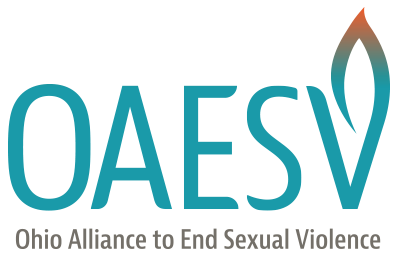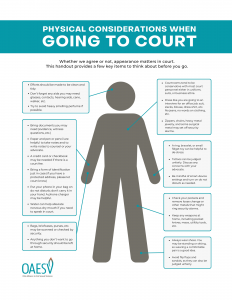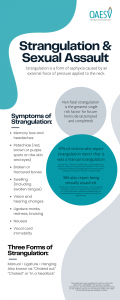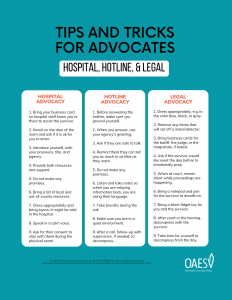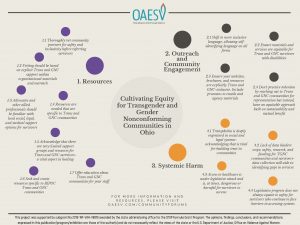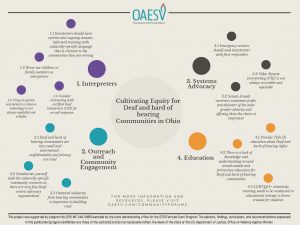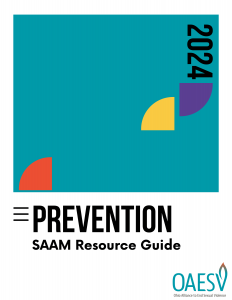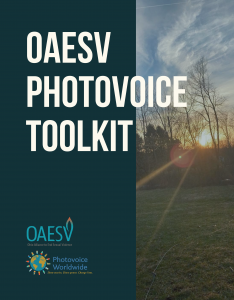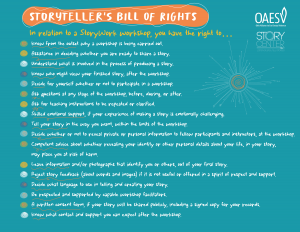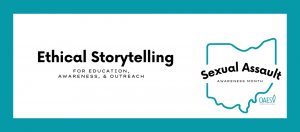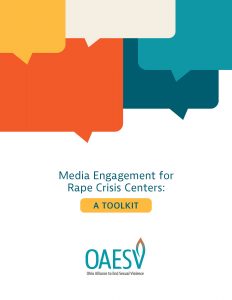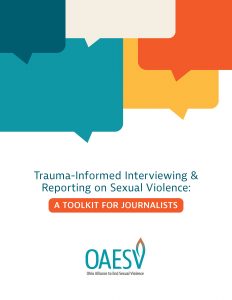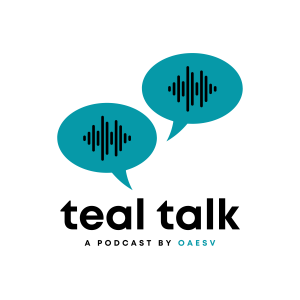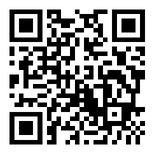Below are several resources by our team built to help survivors receive the services they need and assist advocates to increase their effectiveness. We hope you find this kit helpful in reaching your service objectives. If you have other needs, please don’t hesitate to contact us at info@oaesv.org.
A Survivor’s Guide to Preparing for Court
This double-sided handout covers physical considerations survivors can consider if they pursue the justice system. It also guides them through quick tips while being in the courtroom.
STRANGULATION & SEXUAL ASSAULT INFOGRAPHIC
This infographic gives a brief overview of the crossover between strangulation and sexual violence.
ADVOCATE TIPS & TRICKS
This handout provides tips for advocates while providing hospital, legal, and hotline advocacy.
Increasing Systems Equity While Serving TRANSGENDER AND GNC Communities
Starting in 2021, OAESV conducted community forums around Ohio to hear directly from survivors from specific communities to increase the effectiveness and quality of support services that survivors are receiving.
Increasing Systems Equity While Serving Rural Communities
Starting in 2021, OAESV conducted community forums around Ohio to hear directly from survivors from specific communities to increase the effectiveness and quality of support services that survivors are receiving.
Increasing Systems Equity While Serving DEAF & HARD OF HEARING Communities
OAESV conducted community forums around Ohio to hear directly from survivors from specific communities to increase the effectiveness and quality of support services that survivors are receiving. In 2023, CCRT programming focused on the Deaf and Hard of Hearing community forums with training provided by DeafPhoenix. The community forums highlight key barriers and best practices. We encourage you to use the community forums and strategy guides as a tool for your programs and teams to review together and prioritize best practices for most impacted survivors.
DIGITAL BOOKLET: PREVENTION RESOURCE GUIDE
This guide synthesizes all the prevention-related resources from 2023’s Monthly Prevention Updates newsletters. The guide can be used by anyone in the sexual violence field at any time in their career, with resources ranging from introductory to advanced. The resources also offer varying learning modalities, lengths, and levels of engagement. This is a non-exhaustive list of prevention resources to support all those invested in ending sexual violence.
PHOTOVOICE TOOLKIT
This toolkit serves a full overview of how to facilitate a successful Photovoice project from start to finish. In collaboration with Photovoice Worldwide and several Ohio preventionists, this toolkit provides success stories, sample language, and checklists among many other tips to make your Photovoice project meaningful.
STORYTELLER’s BILL OF RIGHTS
*members only*
This resource was created in collaboration with StoryCenter and OAESV. If you are a survivor of violence, and you want to share your story with an organization for awareness or public policy: you have rights! This “Storyteller’s Bill of Rights” outlines the rights of storytellers from story creation to distribution.
THE SIX STEPS OF ETHICAL PRACTICE IN STORYTELLING
Created in collaboration with StoryCenter and OAESV, this resource is for our member organizations who are interested in facilitating storytelling workshops.
Ethical Storytelling for Education, Awareness, and Outreach
Storytelling is a powerful communication tool in the sexual violence advocacy field. This long-form blog post covers how to align narratives with the ethics, standards, and values of the sexual violence advocacy field to use storytelling to promote positive change and avoid causing harm.
STORY STEWARDSHIP ONLINE COURSE
*members only*
Whether it’s a way to express creativity, to connect, or to aid in the healing of trauma, this online course created in collaboration with StoryCenter and OAESV will cover how to create safe and supportive spaces for survivor storytelling. During this lecture series, participants will: gain insight into the benefits of incorporating storytelling into their work; cultivate personal storytelling skills; understand and navigate ethical dilemmas; establish strategies for stakeholder engagement; and much more!
TIP SHEET for Survivors when Dealing with the Media
This resource is for survivors or co-survivors who are deciding whether or not to talk to news reporters. It covers questions survivors may ask or be asked, what to expect, what can happen when telling their story, and more.
Media Engagement for Rape Crisis Centers
*members only*
This toolkit is for rape crisis centers in Ohio to advance the effectiveness of their relationships with the media and with the narratives shared about their work and sexual violence in their community. It covers best practices in message development and discipline, media landscape, preparing for an interview or conversation, methods for managing anxiety, conquering nervousness, and how to successfully move messages through the media and make an impact.
Trauma-Informed Interviewing & Reporting on Sexual Violence: A TOOLKIT FOR JOURNALISTS
We encourage RCCs to share this resource with journalist when staff are connected with members of the press. This toolkit provides information on how to approach the topic of sexual violence and how to interview survivors and co-survivors in trauma-informed and survivor-centered ways. Many news stories covering sexual violence can be re-traumatizing for those interviewed, those covered in the stories, and those reading the stories. In order to write and publish stories that are more informative and less traumatizing for the public, as well as distributedmore widely, journalists can learn trauma-informed and survivor-centered practices.
ENGAGING MEN RESOURCE BOOKLET
This booklet contains up-to-date resources for victims & survivors of sexual violence who are men, and for practitioners. Resources include books, magazines, podcasts, videos, organizations, groups, and hotlines.
TEAL TALK PODCAST SEASON THREE
We are launching season three of our podcast! Tune in to Teal Talk 3.0, as we continue to interview more professionals in the field and discuss intersectional issues affecting survivors around Ohio.
WHAT DO YOU THINK?
Please consider taking this 5-minute survey to let us know what you think of this year’s toolkit! Just scan the QR code with your smartphone to follow the link, or go to click here.
